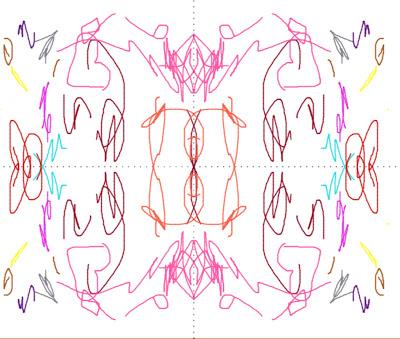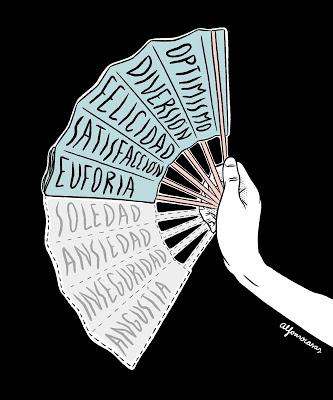
Muchos nos preguntamos cómo con todo lo que llevamos haciendo en el último año y los avances científicos conseguido estemos en la casilla de salida. La realidad parece un endiablado tablero del juego de la oca en el que nos enfrentamos con poca fortuna a un jugador bastante bueno.
La respuesta corta al por qué de nuestra aparente ineptitud contra el coronavirus la podemos escribir con dos palabras: gestión de la complejidad. Y es que nuestras sociedades contemporáneas son redes complejas globalizadas cuya gestión sigue basándose en algoritmos de redes simples no coordinadas. De este modo lo que gestiona un político a nivel nacional no se coordina con el político regional ni con el local, lo que gestiona un ministerio no lo hace con las autonomías, lo que se dice en un hospital no llega al centro de salud y así con todas las redes que la sociedad tiene.
De esta forma el sacrificio de un confinamiento en zonas rurales es inútil si en la gran ciudad sigue funcionando el transporte público saturado o si algunos jóvenes siguen organizando fiestas. De nada sirve que miles usen la mascarilla por zonas despobladas si al mismo tiempo muchos más se la quitan en presencia de otros mientras desayunan en el trabajo o se toman un refresco con amigos en el bar. Poco conseguirá un médico de familia que diagnostica un caso y hace correctamente un estudio de contactos si algunos de estos no se confinan y siguen haciendo vida normal.
Por todo esto pareciera que estamos poniendo puertas al campo y no hay medida que consiga mejorar las cosas. A esto le añadimos que ahora somos todos expertos epidemiólogos y defendemos con vehemencia el confinamiento o su contrario, el uso de una medida o de la otra, dar caña o todo lo contrario. Y con tanto griterío no escuchamos las voces de los que están en primera línea atendiendo cada vez más enfermos ni a los que llevan toda la vida trabajando en control de epidemias. No es una cuestión de sabiduría ni conocimiento sino de reconocer que ante situaciones excepcionales globalizadas ya lo puedes hacer perfectamente en tu casa, barrio, región o país, que si hay un foco de inestabilidad en alguna parte al final te alcanzará dado que no hay barreras ni murallas que nos defiendan de la incertidumbre.
Por lo tanto seremos todos testigos de una nueva ola invernal que afectará a mucha gente. Volveremos a ver el sistema sanitario desbordado. Volveremos a tener confinamiento duro. Iremos viendo como la vacuna va protegiendo cada vez más y quizá lleguemos al verano algo más tranquilos.
Pero estamos hablando de futuro y lo que nos interesa es el presente. Toca cuidarse, dentro de lo posible, y mantener la esperanza de que pase lo que pase esta situación, como todo en la vida, terminará pasando.

Why don't we succeed in bringing the pandemic to a halt?Many of us wonder how, with all that we have been doing over the past year and the scientific advances we have made, we are at square one. The reality seems to be a devilish goose chase where we are playing with little luck against a fairly good player. The short answer as to why our apparent ineptitude against the coronavirus can be written in two words: complexity management. The fact is that our contemporary societies are complex globalised networks whose management is still based on uncoordinated simple network algorithms. In this way, what is managed by a politician at a national level is not coordinated with the regional or local politician, what is managed by a ministry is not coordinated with the autonomous regions, what is said in a hospital does not reach the local health centre and so on with all the networks that society has. In this way, the sacrifice of a confinement in rural areas is useless if in the big city public transport continues to be saturated or if some young people continue to organise parties. There is no point in thousands of people wearing masks in depopulated areas if at the same time many more take them off in the presence of others while they are having breakfast at work or having a drink with friends at the bar. Little will a family doctor diagnose a case and make a correct contact study if some of them are not confined and continue to live a normal life. For all these reasons it seems that we try to stem the tide and there is no measure that will make things better. To this we add that we are now all expert epidemiologists and we vehemently defend confinement or its opposite, the use of one measure or the other, to use force or the opposite. And with so much shouting, we do not hear the voices of those who are on the front line caring for more and more sick people or those who have been working on controlling epidemics all their lives. It is not a question of wisdom or knowledge but of recognising that in exceptional globalised situations you can do this perfectly well in your home, neighbourhood, region or country, that if there is a source of instability somewhere it will eventually reach you because there are no barriers or walls to defend us from uncertainty. Therefore we will all witness a new winter wave that will affect many people. We will see the health system overflowing again. We will once again have hard confinement. We will see how the vaccine will protect us more and more and perhaps we will arrive at the summer with a little more peace of mind. But we are talking about the future and what interests us is the present. We have to take care of ourselves, as far as possible, and maintain the hope that whatever happens, this situation, like everything else in life, will end up happening.

我們為什麼沒有成功遏制大流行?自動翻譯,對錯誤感到抱歉。我們中的許多人都想知道,在過去一年中我們所做的一切以及我們所取得的科學進步,使我們處於第一位。現實似乎是一場惡魔般的追逐,我們在運氣不好的情況下與一位相當出色的玩家對戰。關於為什麼我們明顯不適合冠狀病毒的簡短答案可以用兩個詞來寫:複雜性管理。事實是,我們的當今社會是複雜的全球化網絡,其管理仍然基於不協調的簡單網絡算法。這樣,在國家一級由政治家管理的東西與地區或地方政治家不協調,由部委管理的東西與自治區不協調,在醫院中所說的沒有達到當地健康水平與社會擁有的所有網絡保持一致。這樣,如果在大城市,公共交通繼續變得飽和,或者如果一些年輕人繼續組織聚會,那麼在農村地區禁閉的犧牲就沒有用了。如果在工作中享用早餐或在酒吧與朋友喝酒時,同時有更多的人在其他人在場的情況下脫掉口罩,那麼在人口稀少地區戴著口罩的數千人毫無意義。如果其中一些人不被局限並繼續過正常的生活,家庭醫生幾乎不會診斷出病例並進行正確的聯繫研究。由於所有這些原因,似乎我們試圖阻止潮流,並且沒有任何措施可以使事情變得更好。為此,我們補充說,我們現在都是專家流行病學家,我們堅決捍衛禁閉或其對立,即使用一種手段或另一種手段來使用武力或相反。如此大聲喊叫,我們聽不到那些在一線照顧越來越多的病人或一生致力於控制流行病的人們的聲音。這不是智慧或知識的問題,而是要認識到,在特殊的全球化情況下,您可以在自己的家,街區,地區或國家中完美地做到這一點,如果某個地方存在不穩定的根源,它將最終到達您的手中,因為沒有障礙或牆壁可以保護我們免受不確定性的影響。
